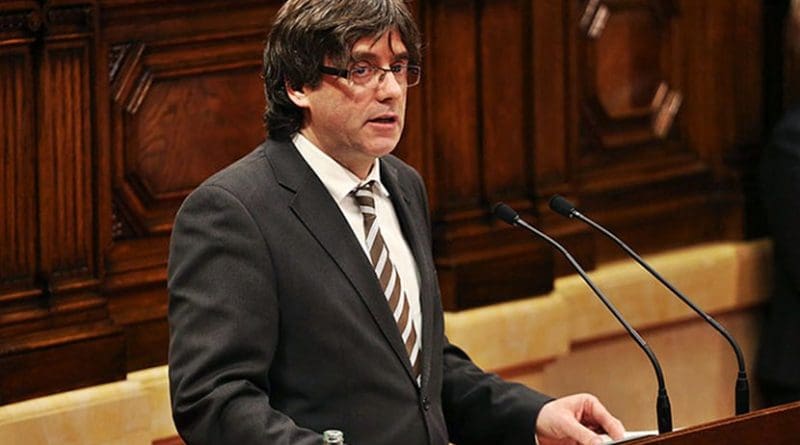Tensions Rise Between Madrid And Catalonia As Political Year Begins
By EurActiv
By Beatriz Rios
(EurActiv) — The recent change of government in Spain has helped ease tensions but a lawsuit filed by Catalan separatist leader Carles Puigdemont in Belgium against the Spanish judge overseeing his case risks stoking the fires again.
The Catalan political conflict rages on, almost one year after the Spanish region’s failed declaration of independence.
In June, the deposed Catalan leader Carles Puigdemont and his former counsellors filed a complaint against Pablo Llarena, the Supreme Court judge handling their case.
The group have been indicted for their role in the referendum and the unilateral proclamation of Catalonia’s independence. But the separatist leaders have questioned the neutrality of justice in Spain and argued they would not have a fair trial at home. A Belgian court will decide next week whether or not to accept the complaint.
After days of hesitation, the Spanish government decided to take part in the defence. At first, they argued the lawsuit was not against the Spanish Judicial System but a private affair of Judge Llarena.
But on Tuesday (28 August), Prime Minister Pedro Sánchez highlighted that the defence of the judge constituted “state affairs” and the government hired a law firm in Belgium to deal with the case.
Puigdemont said on Monday that the Spanish government made its decision due to “political pressures”. That, he said, proved his argument that the judiciary process is “a case of political persecution”.
The former Catalan president insisted that it would be a “very serious precedent” if Madrid decided “to pay for the judicial defence of a Spanish citizen, whether he is a judge or not”.
The Catalan politicians are accused of rebellion, secession, disobedience and misuse of funds, due to their participation in the organisation of the referendum and the unilateral declaration of the independence of Catalonia.
Puigdemont and his counsellors, who fled Spain last October to avoid their deposition and possible prosecution, argued that independence of justice is not guaranteed in Spain and that minorities fighting politically for their own independence “suffer a systematic violation of their fundamental rights”.
Wrong translation
Furthermore, Puigdemont and his colleagues accused Judge Pablo Llarena of violating the presumption of innocence, based on a statement issued during a private event in February. However, their accusation was supported with an inaccurate translation.
Arguing that Puigdemont and his former government colleagues could not be considered political prisoners, Judge Llarena said the crimes they were accused of were included in the Spanish criminal code.
“Regardless of what may have been the motivation that led them to commit them [the crimes], if they have done so, they should be investigated,” Llarena stressed.
In the French translation presented to the Belgian court, the accusation turned the conditional “if they have been” into an affirmative sentence “and they have been”.
This, indeed, would have implied that the Judge assumed that they were guilty of the charges.
Following media reports on the misleading translation, Puigdemont’s lawyers blamed the mistake on the translator and said they would change it. But they insisted that the error was not relevant and did not affect to the actual content of the lawsuit.
The challenges ahead
The case against Llarena came amid growing tensions between unionists and pro-independence supporters as the start of the political year approaches. Puigdemont met in Waterloo on Monday with the current chief of the regional government, Quim Torra, to discuss their strategy.
Puigdemont said the horizon could be full of “dark clouds” or “great opportunities,” depending on the attitude of the new Spanish government led by Sánchez, a social democrat.
Next week’s trial will be the first confrontation for the two men but it will certainly not be the last. In the coming days, Sánchez will face a second vote on the revised fiscal path to balance Spain’s accounts, after failing to get parliament’s approval in July.
Sánchez needs the nationalist parties’ votes as he only controls 84 seats in the 350-seat parliament.
Failure to win parliament’s approval for setting a spending ceiling, and therefore to pass the annual budget for 2019, could bring down the government.
On 11 September, Catalans celebrate the National Day of Catalonia known as ‘Diada’. Torra called on people to take to the streets this year more than ever to call for the region’s independence.
A few weeks later, it will be the first anniversary of the referendum (1 October) and then the unilateral declaration of independence (27 October) in Catalonia. Political demonstrations in the region are expected around those days.
Torra insisted that, whatever the outcome of the dialogue with the Spanish government, his mandate is to respect the will of the people of Catalonia “expressed in the referendum” last year.

